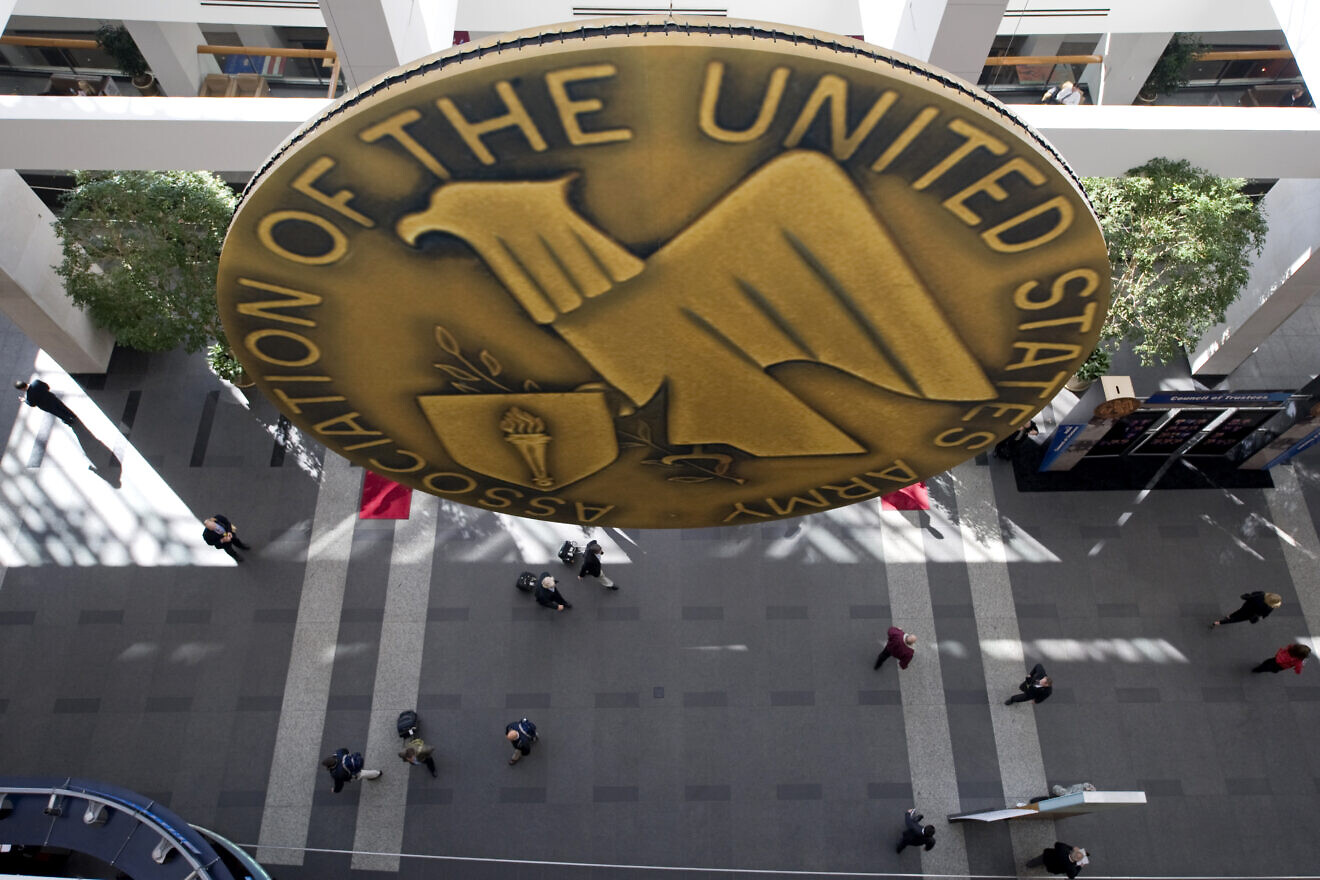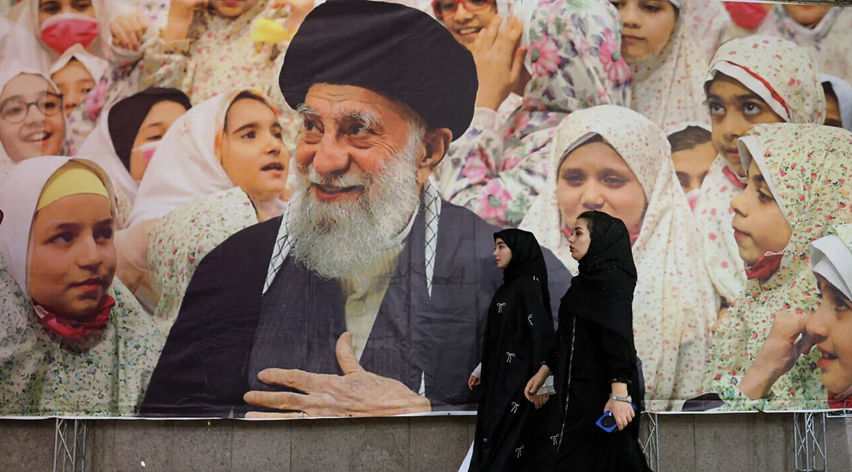The Association of the United States Army emblem hangs in the Washington Convention Center in Washington D.C., on Oct 7, 2008. Credit: D. Myles Cullen/U.S. Army Photo.
By Mike Wagenheim
As the three-day Association of the United States Army annual meeting and exhibition wound down on Oct. 16 in Washington, word spread among Israeli defense companies that Emmanuel Macron, the French president, intended to ban them from the upcoming Euronaval defense fair outside Paris.
A spokesman for a major Israeli defense company told JNS on Wednesday at the Washington event that France’s decision to bar Israeli companies “is not surprising,” referring further questions to the Israeli Defense Ministry. A ministry representative at the event declined to comment.
That same day, Yoav Gallant, the Israeli defense minister, said Macron’s “actions are a disgrace to the French nation and the values of the free world, which he claims to uphold.”
“The decision to discriminate against Israeli defense industries in France a second time aids Israel’s enemies during war. This builds on the decision to place an arms embargo on the Jewish state,” Gallant stated. “France has adopted, and is consistently implementing, a hostile policy towards the Jewish people. We will continue defending our nation against enemies on seven different fronts, and fighting for our future—with or without France.”
Paris also uninvited Israeli companies to the larger Eurosatory exhibit in June. A French court overturned that decision, but it was too late for the Jewish state to participate. The court further ruled that it was discriminatory to bar Israeli citizens from the show unless they signed a waiver declaring they were attending in personal rather than official capacities.
At the event in Washington, Israeli defense sector leaders told JNS that they felt welcome in the United States.
Rafael Advanced Defense Systems is “very proud of our relationships and very happy to present our products that help protect the forces of democratic countries,” Yoav Turgeman, the company’s CEO, told JNS.
“Unlike perhaps Eurosatory—a very unfortunate event—we are very, very welcome here,” Turgeman said. “We are received in a very good way.” He cited the “quantity and degree” of potential customers who visited the company’s display.
“The powers in the world know how to appreciate this,” he said.
‘You feel more welcome here’
Asio Technologies was one of more than a dozen small-to-medium-sized businesses appearing at the Washington event under the banner of SIBAT, the Israeli Defense Ministry’s international defense cooperation directorate, which bridges the ministry’s work and that of the defense industry.
David Harel, CEO of Asio, told JNS that his company was registered for the Eurosatory. “We were banned from participating, so we came here,” he said. “You feel more welcome here.”
Since Russia invaded Ukraine in February 2022—and especially after Hamas attacked Israel on Oct. 7, 2023—Asio is “the center of it,” Harel told JNS. “There is a large interest in our products, both in Israel and from all over the world.”
Ariel Kandel, CEO of Imco Industries, told JNS that his company was also Eurosatory-bound before it was uninvited. “I am sorry for that, but I hope that next year will be a different place,” he said. (Kandel spoke with JNS before the news broke that Macron was banning Israeli companies from Euronaval.)
“There is still business-to-business operation in between Europe and Israel,” Kandel said. “I think it will maintain like that, and I hope the public opinion will be changed day to day.” He added that “most of the companies in the defense market are more into what’s going on in the territory.”
‘The front lines’
Representatives of Israeli companies presented their wares to JNS during the event in Washington.
Turgeman showed a model of Rafael’s Tamir ballistic missile interceptor, part of the Iron Dome, and the Stunner, which counteracts longer-range ballistic missiles. He also displayed part of the Iron Beam—the much-discussed, high-power laser system that can reportedly intercept cruise missiles, drones and rockets—he said the company aims to introduce next year.
The company also showed the Trophy, an “active protection system” that “is protecting our tanks and in armored vehicles all over the world, not only in Israel,” he said.
“This system is also evolving, countering new threats in a very efficient way,” Turgeman told JNS. “If you can see the Israeli tanks in the conflict we have in Gaza, in Lebanon, they are fully protected. They are maneuvering quite freely, as opposed to what we have seen in Ukraine, where the tanks were heavily attacked and damaged.”
The Trophy is a symbol of cooperation between Jerusalem and Washington, and the system is installed on many of the U.S. Army’s Abrams tanks, Turgeman said.
Harel showed JNS some of Asio’s land forces some tactical solutions, including the Orion.
“It allows the land commander—from a sergeant until the battalion level—to plan, to execute, to debrief, to navigate, to communicate to GIS, analyze GIS systems,” he said, referring to geographic information systems that store, analyze and display data connected to specific locations.
“It’s currently widespread in the majority of the combat units in Israel,” Harel said of GIS technologies.
Ariel Kandel, of Imco, took JNS through a mock-up of the inside of an armored personnel carrier, with screens stationed around the vehicle’s inside, each with a touch screen, with a wealth of critical data and information available at an arm’s length.
“We are using artificial intelligence to help the operator of the vehicle to recognize targets, to drive the vehicle and to open the internal system of the vehicle, from engine power up to a weapons system,” Kandel said.
He demonstrated to JNS how the operator can access a panoramic view to gain situational awareness.
Soldiers in the vehicle have the system available at their fingertips. The gunner’s screen, for example, can operate the weapons system.
Overall, each Israeli exhibitor JNS spoke to reported being welcomed at the Association of the United States Army meeting. Over the weekend, footage emerged of a man off-camera purporting to be from the fake company Levantine Defense Industries, asking Israeli company representatives about “baby-shredding technology.”
Source: JNS


































